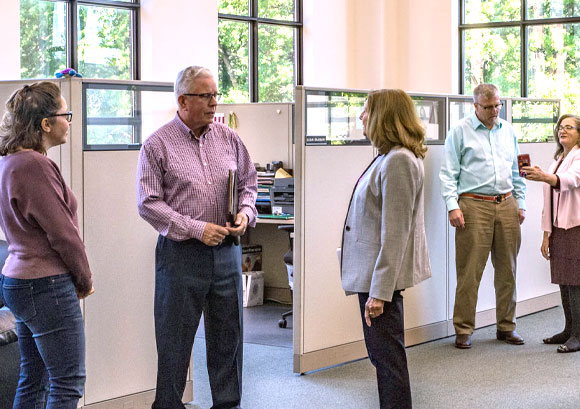Networking Tips
“I Hate Networking!”
Condensed from The Harvard Business Review
“I hate networking.” We hear this all the time from executives, professionals, and business owners. They tell us that networking makes them feel uncomfortable and phony. Although some people have a natural passion for it—namely, the extroverts who love and thrive on social interaction—many see it as inauthentic.
But in today’s world, networking is a necessity. A mountain of research shows that professional networks lead to more business opportunities, broader and deeper knowledge, improved capacity to innovate, faster advancement, and greater status and authority. Fortunately, our research shows that an aversion to networking can be overcome. We’ve identified four strategies to help people change their mindset.
Focus on Learning
Some think primarily about the advancement, and accomplishments that networking can bring them, while others see it as an obligation for professional reasons.
It’s possible, however, to shift your mindset, so that you see networking as an opportunity for discovery and learning rather than a chore.
Consider a work-related social function you feel obliged to attend. You can tell yourself, “I hate these kinds of events. I’m going to have to put on a show and schmooze and pretend to like it.” Or you can tell yourself, “Who knows—it could be interesting. Sometimes when you least expect it, you have a conversation that brings up new ideas and leads to new experiences and opportunities.”

Identify Common Interests
The next step in making networking more palatable is to think about how your interests and goals align with those of people you meet and how that can help you forge meaningful working relationship – the shared activities principle. Numerous studies in social psychology have demonstrated that people establish the most collaborative and longest-lasting connections when they work together on tasks that require one another’s contributions. This “task interdependence” can be one of the biggest sources of positive energy in professional relationships.
When your networking is driven by substantive, shared interests, it will feel more authentic and meaningful and is more likely to lead to relationships that have those qualities too.

Think About What You Can Give
Even when you do not share an interest with someone, you can probably find something valuable to offer by thinking beyond the obvious. We’ve found that people who feel powerless—because they are less experienced, because they belong to a minority, or for other reasons—often believe they have too little to give and are therefore the least likely to engage in networking, even though they’re the ones who will probably derive the most benefit from it. Senior people are typically much more comfortable networking than junior people. When people believe they have a lot to offer others, such as advice, mentorship, access, and resources, networking feels easier and less selfish.
Most people tend to think too narrowly about the resources they have that others might value. When you think more about what you can give to others than what you can get from them, networking will seem less self-promotional and more selfless—and therefore more worthy of your time.
Find a Higher Purpose
Another factor that affects people’s interest in and effectiveness at networking is the primary purpose they have in mind when they do it. In one study we found that people who focused on the collective benefits of making connections (“support my company” and “help my clients”) rather than on personal ones (“support or help my career”) felt more authentic while networking. Any work activity becomes more attractive when it’s linked to a higher goal. So frame your networking in those terms.
Summary
Many if not most of us are ambivalent about networking. We know that it’s critical to our professional success, yet we find it taxing and often distasteful. These strategies can help you overcome your aversion. By shifting to a promotion mindset, identifying and exploring shared interests, expanding your view of what you have to offer, and motivating yourself with a higher purpose, you’ll become more excited about and effective at building relationships that bear fruit for everyone.
